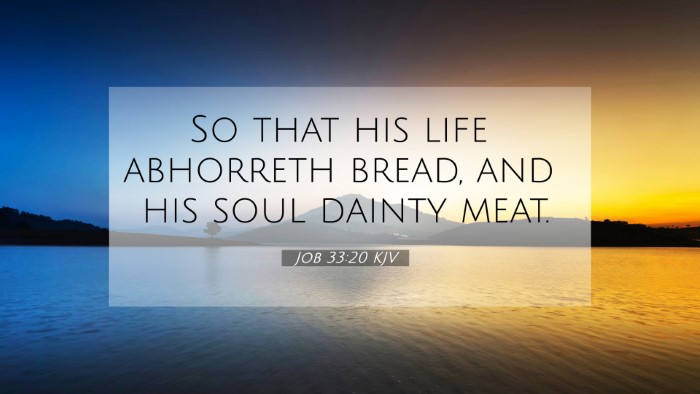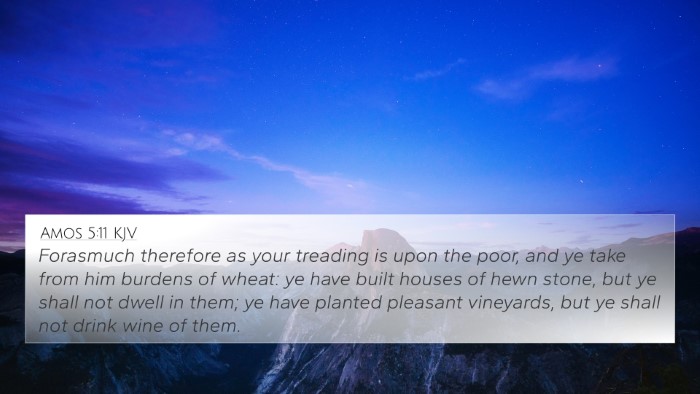Understanding Job 33:20
Bible Verse: Job 33:20 - "So that his life abhors bread, and his soul dainty meat."
In this verse, we find Elihu, one of Job's friends, speaking about the effects of suffering on a person's appetite and overall well-being. The verse reflects a deep theme in the Book of Job regarding human suffering, divine communication, and the desire for restoration.
Summary of Commentary Insights
This verse illustrates the severe emotional and physical toll that suffering can take on an individual. Various public domain commentaries provide enriching insights into this poignant expression:
-
Matthew Henry:
Henry explains that when a person is under the afflicting hand of God, it can lead to a state where they lose all appetite for food and comfort. This is symbolic of deeper spiritual distress; when the soul is heavy, the body often reflects this condition.
-
Albert Barnes:
Barnes brings attention to the metaphorical nature of the verse. He emphasizes that this loss of appetite signifies a deeper longing—one for relief from suffering, suggesting that the soul’s condition can affect physical sustenance. This serves as a reminder of the interconnectedness of body and spirit in times of distress.
-
Adam Clarke:
Clarke interprets this verse as highlighting the severity of Job's suffering. He delineates that the pain and anguish that Job experiences create such a disconnection from the pleasures of life, including food, pointing toward the importance of divine intervention in restoring joy and health.
Inter-Biblical Links
This verse can be connected to numerous other scriptures that resonate with its themes of suffering, recovery, and divine listening. Here are some Bible cross-references that enhance our understanding:
- Psalm 42:5: "Why are you cast down, O my soul? And why are you in turmoil within me?" - This verse reflects a similar sentiment of emotional despair.
- Isaiah 38:15: "What shall I say? He has spoken to me, and he himself has done it." - Acknowledges suffering as part of God’s dealings with us.
- Philippians 4:12-13: "I know how to be brought low, and I know how to abound... I can do all things through him who strengthens me." - A connection to finding strength in suffering.
- Jeremiah 30:17: "For I will restore health to you, and your wounds I will heal." - Points to God’s promise to alleviate suffering and restore well-being.
- 2 Corinthians 1:3-4: "Blessed be the God and Father of our Lord Jesus Christ... who comforts us in our afflictions." - Stresses the aspect of comfort during suffering.
- Matthew 5:4: "Blessed are those who mourn, for they shall be comforted." - Aligns with the idea of grief leading to divine comfort.
- 1 Peter 5:10: "And after you have suffered a little while, the God of all grace... will himself restore, confirm, strengthen, and establish you." - A promise of restoration after suffering.
Thematic Connections and Analysis
The linkages between these scriptures allow for a comparative analysis that reveals a dominant biblical theme: God's compassion for those who suffer. Each verse serves as a building block in understanding how divine intervention is not simply an abstract idea but a promise that manifests in tangible ways:
- Connections Between Old and New Testament: The motifs of suffering in Job parallel those in the New Testament, where Jesus assures His followers of comfort in pains, creating a continuous thread of theological understanding.
- Afflicted Ones Comforted: Job's lament echoes through the Psalms and the New Testament, where believers are reminded of God's promises during dark times.
- Human Condition and Divine Interaction: The link between the physical and spiritual echoed in this verse represents the holistic nature of man that scripture consistently highlights.
Cross-Referencing Tools
To further dive into the connections of Job 33:20, utilizing tools for Bible cross-referencing can be invaluable. Here are some suggestions:
- Bible Concordance: A reference tool that provides a listing of words and their corresponding verses.
- Bible Cross-reference Guide: Helpful in locating connections between key themes and verses.
- Bible Cross-reference System: These systems help in tracing thematic threads across scripture, enhancing understanding.
- Comprehensive Bible Cross-reference Materials: Resources that compile extensive links between verses.
Conclusion
In conclusion, Job 33:20 presents a poignant acknowledgment of human suffering that is deeply explored through a variety of scripts and commentaries. Understanding this verse requires both individual reflection and communal exploration of related texts. By engaging with cross-references and thematic studies, one gains a richer comprehension of God's promises in the face of suffering.
For anyone searching for deeper meanings of scripture, exploring cross-referenced verses can lead to profound insights into God’s nature and His dealings with humanity, revealing a tapestry of divine communication throughout the Bible.







